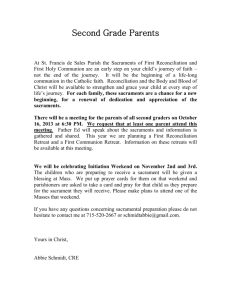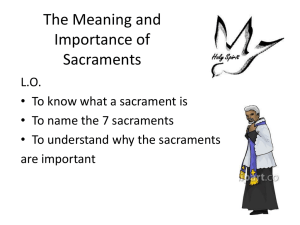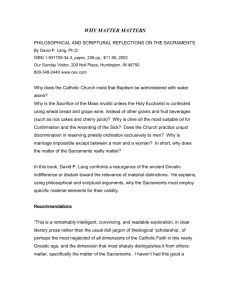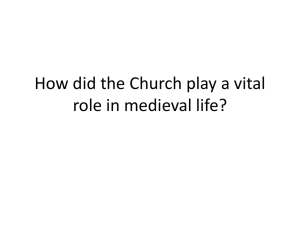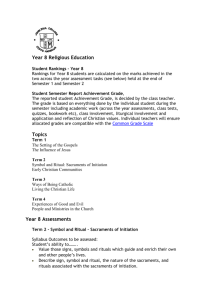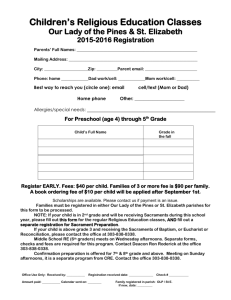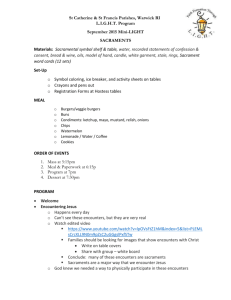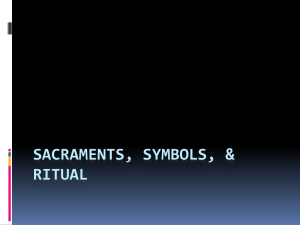Sacraments: Privileged Encounters with Jesus Christ What Are
advertisement
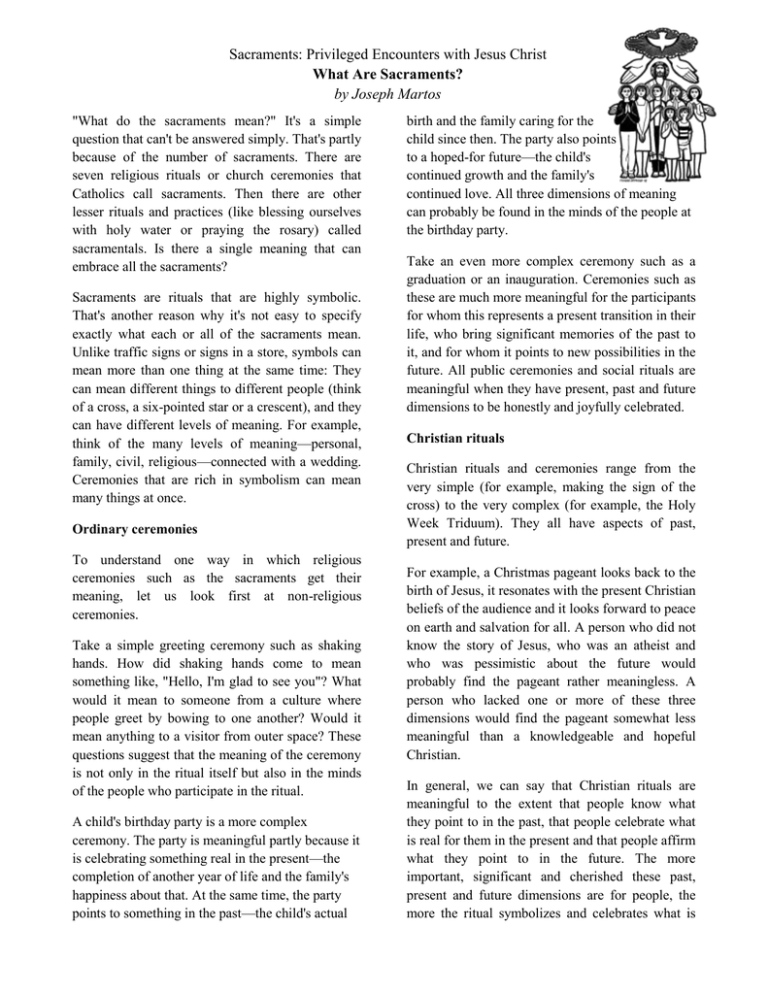
Sacraments: Privileged Encounters with Jesus Christ What Are Sacraments? by Joseph Martos "What do the sacraments mean?" It's a simple question that can't be answered simply. That's partly because of the number of sacraments. There are seven religious rituals or church ceremonies that Catholics call sacraments. Then there are other lesser rituals and practices (like blessing ourselves with holy water or praying the rosary) called sacramentals. Is there a single meaning that can embrace all the sacraments? Sacraments are rituals that are highly symbolic. That's another reason why it's not easy to specify exactly what each or all of the sacraments mean. Unlike traffic signs or signs in a store, symbols can mean more than one thing at the same time: They can mean different things to different people (think of a cross, a six-pointed star or a crescent), and they can have different levels of meaning. For example, think of the many levels of meaning—personal, family, civil, religious—connected with a wedding. Ceremonies that are rich in symbolism can mean many things at once. Ordinary ceremonies To understand one way in which religious ceremonies such as the sacraments get their meaning, let us look first at non-religious ceremonies. Take a simple greeting ceremony such as shaking hands. How did shaking hands come to mean something like, "Hello, I'm glad to see you"? What would it mean to someone from a culture where people greet by bowing to one another? Would it mean anything to a visitor from outer space? These questions suggest that the meaning of the ceremony is not only in the ritual itself but also in the minds of the people who participate in the ritual. A child's birthday party is a more complex ceremony. The party is meaningful partly because it is celebrating something real in the present—the completion of another year of life and the family's happiness about that. At the same time, the party points to something in the past—the child's actual birth and the family caring for the child since then. The party also points to a hoped-for future—the child's continued growth and the family's continued love. All three dimensions of meaning can probably be found in the minds of the people at the birthday party. Take an even more complex ceremony such as a graduation or an inauguration. Ceremonies such as these are much more meaningful for the participants for whom this represents a present transition in their life, who bring significant memories of the past to it, and for whom it points to new possibilities in the future. All public ceremonies and social rituals are meaningful when they have present, past and future dimensions to be honestly and joyfully celebrated. Christian rituals Christian rituals and ceremonies range from the very simple (for example, making the sign of the cross) to the very complex (for example, the Holy Week Triduum). They all have aspects of past, present and future. For example, a Christmas pageant looks back to the birth of Jesus, it resonates with the present Christian beliefs of the audience and it looks forward to peace on earth and salvation for all. A person who did not know the story of Jesus, who was an atheist and who was pessimistic about the future would probably find the pageant rather meaningless. A person who lacked one or more of these three dimensions would find the pageant somewhat less meaningful than a knowledgeable and hopeful Christian. In general, we can say that Christian rituals are meaningful to the extent that people know what they point to in the past, that people celebrate what is real for them in the present and that people affirm what they point to in the future. The more important, significant and cherished these past, present and future dimensions are for people, the more the ritual symbolizes and celebrates what is sacred for them. That makes it more meaningful for them. Catholic sacraments The Latin word sacramentum means "a sign of the sacred." The Catholic sacraments are ceremonies that point to what is sacred, significant and important for Christians. Members of the Catholic, Orthodox and Anglican/Episcopal traditions call seven of their religious ceremonies sacraments. Most Protestants count only two rituals—Baptism and Communion—as sacraments. Nevertheless, Protestants have ceremonies that are similar to Catholic sacraments, for example, weddings and ordinations. Sacraments are celebrations of Christian tradition, of Christian life and of Christian hope. They share the dimensions of past, present and future that give ordinary celebrations meaning. St. Thomas Aquinas wrote a prayer about the Eucharist that illustrates the point: "O sacred banquet, in which Christ is received, the memory of his Passion is renewed [past], the mind is filled with grace [present], and the pledge of future glory is given to us [future]." Today we commemorate this understanding of sacrament when we pray the following version of the Memorial Acclamation at Mass: "Christ has died, Christ is risen, Christ will come again." Sacraments, though, are no ordinary celebrations. They are special occasions for experiencing God's saving presence. It is important for people to be in touch with what the sacraments celebrate if the rituals are to be as meaningful as possible for them. Sometimes people who participate in a sacramental celebration do not fully appreciate one or another of the dimensions of a sacrament's meaning. In this case, the sacrament speaks its meanings, as it were, to those attending the ceremony and invites them to find out more about them. The sacrament also calls people to get in touch with the sacred realities it celebrates. The more people respond to this call (for example, Reconciliation's call to forgive and accept forgiveness), the more they will find meaning in the sacrament. Sacraments celebrate Christ's life Of all the events that sacraments can point to in the past (biblical events, Church traditions, events in one's own faith journey), the most important are events in the life of Christ. Tradition tells us that all of the sacraments were instituted by Christ. Indeed, they each have a real foundation in the life and ministry of Jesus. Each relates to stories and teachings of Jesus. For example, Baptism calls to mind the baptism of Jesus in the Jordan, and the way Jesus gathered a community around himself. It also reminds us of the command of the risen Lord to carry the gospel to others and to baptize them. Eucharist reminds us of the Last Supper. Those familiar with the Gospels are also reminded of other meals to which Jesus invited even those who were rejected by others. Reconciliation reminds us of Jesus' invitation to forgive one another, and of the way he forgave those who put him to death. The Catechism of the Catholic Church ties together the many meanings of sacraments thus: "The sacraments are efficacious signs of grace, instituted by Christ and entrusted to the Church, by which divine life is dispensed to us. The visible rites by which the sacraments are celebrated signify and make present the graces proper to each sacrament. They bear fruit in those who receive them with the required dispositions" (#1131). Sacraments celebrate the community's life Each sacrament dramatizes and points to something that is happening in the lives of people who belong to the celebrating community. For example, Eucharist strengthens the unity of Christians as they receive it. It celebrates God's nourishing presence with us now. Sacraments celebrate the community's life now. Taking friends out to dinner or giving them presents is meaningful in part because it signifies how we feel toward them right now. A graduation ceremony is meaningful because it occurs at a moment when people have completed an important stage in their education. One reason for the current question about what age is right for Confirmation is that people cannot all agree about what exactly the sacrament should point to in the lives of those being confirmed. It is easier to see what other sacraments are celebrating, however. For example, through the Baptism ceremony, some people are entering the Christian community while others are supporting and welcoming them into community. In Matrimony and Ordination ceremonies, people are likewise undergoing important changes in their relationships with others through the very process of the ceremony. Sacraments celebrate the Kingdom of God The sacraments also point to a future which Jesus referred to as God's kingdom, realm or reign. God already reigns in hearts that are converted to doing God's will and to loving others as Jesus instructed. God's realm is already found wherever justice and compassion are the basis of human relationships between individuals, in a group, in an institution or even in a whole society. But the kingdom is always incomplete, so the sacraments look forward to the coming of God's kingdom in its fullness. Of all the time dimensions of sacramental meaning, the future dimension is the most elusive. We remember the past and we can see the present, but how do we get in touch with the future? Yet somehow we do this every time we participate in a ritual that we find meaningful. When we shake hands and say hello, we are looking forward to the development of a relationship. When we celebrate our friends' wedding anniversary and when we attend Fourth of July fireworks, we are expressing hope for that couple and for our country in the future. Children who make their first Communion or first Confession are expressing a desire to get closer to God. People who get married in church or who are ordained to the priesthood are saying something about their future in relation to God and the Christian community. But sacraments imply more than just a personal future. They also point to the possibility and hope that the realities they celebrate will someday reign over all the earth. Eucharist looks forward to the time when all will be one. Reconciliation speaks the possibility of peace among all families and nations. Anointing of the Sick points to the hope that illness and disease will someday be no more. Making the connections We often hear people talking about the meaning of the sacraments as though it were a simple thing, as though each sacrament had a single simple meaning. We see now, however, that the actual meaning of any sacramental celebration is rich and complex, for it has multiple dimensions. A sacrament's meaning is multidimensional because it points to three different time dimensions: past, present and future. A sacrament also has multiple levels of depth because (1) it can be personally meaningful for an individual at one level, (2) it can have a shared meaning for a particular group at another level, (3) it can have a general meaning for the whole Church at yet a third level. When people talk about the meaning of a sacrament, they may be referring to its general meaning or to its meaning in the life of the institutional Church. Yet sacraments are celebrations of God's gift and gracious action in our lives. The fruitfulness of a sacramental celebration is strongly dependent on the connections among the people and to what the dimensions of past, present and future bring to the celebration. In order for sacraments to be meaningful celebrations for us, we need to be grounded in Scripture, involved with our faith community and working toward God's reign. Dr. Joseph Martos is director of the Russell Institute of Religion and Ministry at Spalding University in Louisville, Kentucky, where he teaches courses in theology and religious studies. He has written two books and many articles on the sacraments, and he has given lectures, presented workshops and taught courses in many dioceses around the United States.
